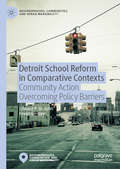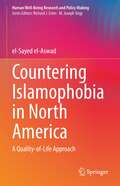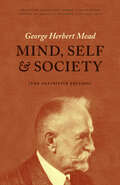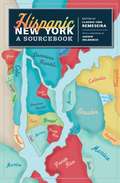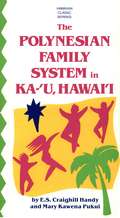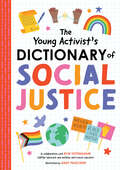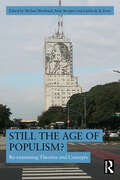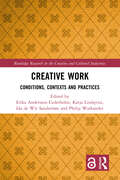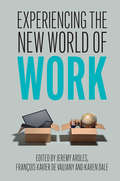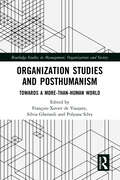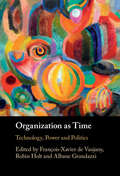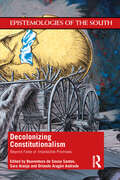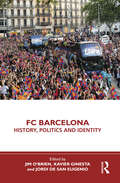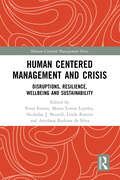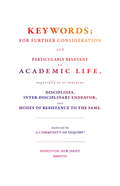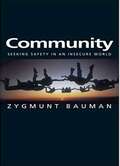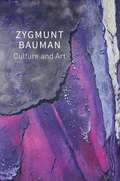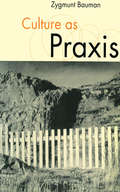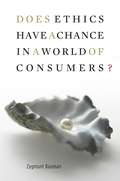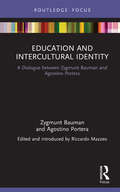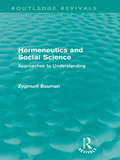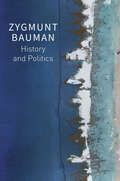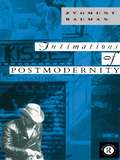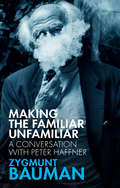- Table View
- List View
Detroit School Reform in Comparative Contexts: Community Action Overcoming Policy Barriers (Neighborhoods, Communities, and Urban Marginality)
by Edward St. John feven girmayThis book critically examines how the narrative of global economic competition was used to rationalize college preparatory curriculum for all high school students and promote charter schools in Detroit. Using mixed qualitative and quantitative methods, the study identifies neighborhood risk factors undermining students’ academic success, along with the positive effects of churches and service centers as mitigating forces. The authors focus on a range of topics and issues including market competition, urban decline, community resources, testing and accountability, smaller schools, and engaged learning. The volume illustrates how action studies by engaged scholars working with community activists empowers students to overcome emerging barriers.
Countering Islamophobia in North America: A Quality-of-Life Approach (Human Well-Being Research and Policy Making)
by el-Sayed el-AswadThis book puts together grounded research on the discourses that counter Islamophobic tropes in North America. Dealing with an important and urgent issue of human rights, it explores how public policies, new conceptualizations, and social movements can transform Islamophobia into a positive and healthy discourse. Surprisingly, and apart from selected media studies, empirical investigations about countering xenophobia and hate are rare. The book proposes effective means and mechanisms to help generate debate, dialogue, and discussion concerning policy issues to mitigate Islamophobia. Written in uncomplicated language, this topical book will attract specialist and non-specialist readers interested in the topic of Islamophobia, understanding the roots of Islamophobic hate rhetoric, and how to counter it.
Mind, Self & Society: The Definitive Edition
by Hans Joas George Herbert Mead edited by Charles W. Morris annotated by Daniel R. HuebnerGeorge Herbert Mead is widely recognized as one of the most brilliantly original American pragmatists. Although he had a profound influence on the development of social philosophy, he published no books in his lifetime. This makes the lectures collected in Mind, Self, and Society all the more remarkable, as they offer a rare synthesis of his ideas. This collection gets to the heart of Mead’s meditations on social psychology and social philosophy. Its penetrating, conversational tone transports the reader directly into Mead’s classroom as he teases out the genesis of the self and the nature of the mind. The book captures his wry humor and shrewd reasoning, showing a man comfortable quoting Aristotle alongside Alice in Wonderland. Included in this edition are an insightful foreword from leading Mead scholar Hans Joas, a revealing set of textual notes by Dan Huebner that detail the text’s origins, and a comprehensive bibliography of Mead’s other published writings. While Mead’s lectures inspired hundreds of students, much of his brilliance has been lost to time. This new edition ensures that Mead’s ideas will carry on, inspiring a new generation of thinkers.
Hispanic New York: A Sourcebook
by Remeseira Claudio Iván ed. Foreword by Andrew DelbancoOver the past few decades, a wave of immigration has turned New York into a microcosm of the Americas and enhanced its role as the crossroads of the English- and Spanish-speaking worlds. Yet far from being an alien group within a "mainstream" and supposedly pure "Anglo" America, people referred to as Hispanics or Latinos have been part and parcel of New York since the beginning of the city's history. They represent what Walt Whitman once celebrated as "the Spanish element of our nationality."Hispanic New York is the first anthology to offer a comprehensive view of this multifaceted heritage. Combining familiar materials with other selections that are either out of print or not easily accessible, Claudio Iván Remeseira makes a compelling case for New York as a paradigm of the country's Latinoization. His anthology mixes primary sources with scholarly and journalistic essays on history, demography, racial and ethnic studies, music, art history, literature, linguistics, and religion, and the authors range from historical figures, such as José Martí, Bernardo Vega, or Whitman himself, to contemporary writers, such as Paul Berman, Ed Morales, Virginia Sánchez Korrol, Roberto Suro, and Ana Celia Zentella. This unique volume treats the reader to both the New York and the American experience, as reflected and transformed by its Hispanic and Latino components.
The Polynesian Family System in Ka-'U, Hawai'i
by e. s. Craighill Handy Mary Kawena PukuiThis classic book on Hawaiian families and culture is an essential text for anyone interested in pre-American Hawaii.The Polynesian Family System in Ka-'U, Hawai'i is a collaboration of the distinguished scholars Dr. Mary Puku and Dr. E.S. Craighill Handy. <P><P> It provides us with this fascinating review of traditional Hawaiian life. Manners and customs relating to birth, death, marriage, sexual practices, religious beliefs, and family relationship are all clearly described. The main sources of information were elderly Hawaiian informants of then remote Kacu district of the island of Hawaii.This Hawaiian history and culture book provides professional scholars and laymen a like with an unrivaled picture of traditional Hawaiian society. Based on original work in the field with living Hawaiians, it combines research into the literature by two authors of unusual qualifications with field work conducted under unique circumstances. This edition will be welcomed by librarians, anthropologists, and indeed all who have a serious interest in Polynesian life.
The Young Activist's Dictionary of Social Justice
by duopress labsA Is for Ally, Advocate, Anti-Racist, Ancestors, and Assembly Using simple explanations and appealing illustrations in a familiar A-to-Z format, The Young Activist's Dictionary of Social Justice will teach kids the new vocabulary of change. Vetted by an anti-bias, anti-racism educator, this essential new resource is packed with easily understandable definitions of timely concepts. Each beautifully designed spread represents a letter and provides concise, age-appropriate definitions for 10 or more terms, with subject matter spanning issues like racial justice, climate change, gender equality, LGBTQ+ rights, income disparity, voter engagement, and immigration. In addition to information, the pages are also full of inspiration: Bite-sized bios accompany key terms, illuminating the stories of justice advocates who got involved with a cause at a young age. Infographics and sidebars bring complementary concepts to life. And with the rich resource section in the back, kids can read more about how to take action on the cause that&’s meaningful to them. Read on, and let&’s work together for a more equal world for all. Featuring: Audrey Faye Hendricks (arrest) Claudette Colvin (boycott) Iqbal Masih (child labor) Greta Thunberg (climate justice) Malala Yousafzai (education) Mari Copeny (environmental racism) Parkland Survivors (gun control) Ruby Bridges (integration) Frederick Douglass (literacy) John Lewis (nonviolence) Clara Lemlich (organize) Marley Dias (representation) Dolores Huerta (strike) Jazz Jennings (transition) Autumn Peltier (water protector)
Still the Age of Populism?: Re-examining Theories and Concepts
by Michael Bernhard Amie Kreppel de la Torre, CarlosStill the Age of Populism? investigates current conceptions of populism and its relevance across the globe. Using contextualized case studies, cross-national comparisons, and theoretical interventions, this volume addresses key conceptual debates in comparative politics and political sociology.This essential volume brings together scholars from different traditions in political sociology, political science and cultural studies, and comparativists and area experts working on Latin America, Western and Eastern Europe, and the US. Chapters in the book employ innovative theoretical approaches to study aspects of populism in global comparative perspective whilst regional case studies, including Brazil, Venezuela, Germany, and the US, are utilised to explore populism in geographically specific contexts. In doing so, the volume addresses the key issues for those seeking to understand contemporary populism. What are the advantages and limits of the category of populism to understand contemporary debates on democratization and processes of democratic erosion? Under what structural, institutional, and cultural conditions does populism emerge? Is populism the nemesis of democracy, its shadow, or a path to move beyond “liberal democracy” towards “real democracy”? What lessons does the history of past populist moment hold for our understanding of contemporary populist governance? Under what conditions have populists in office led to political polarization and democratic erosion? What comes after populism, and how do societies deal with its legacies?Still the Age of Populism? will be of interest to a broad audience of students and scholars of political sociology and comparative politics.
Creative Work: Conditions, Contexts and Practices (Routledge Research in the Creative and Cultural Industries)
by Erika Andersson Cederholm Katja Lindqvist de Wit Sandström, Ida Philip WarkanderHow do creative workers work? This book brings together insights from a range of relevant disciplines to help answer this significant research question.Featuring case studies from the European context, contributors tap into the experiences and practices from creative workers, demonstrating their attempts to navigate a changing environment which affects spaces, identities, and professional roles. As cross-disciplinary re-thinking of work, labour processes and management practices in the creative and cultural industries, the book offers perspectives on the importance of highlighting creative work as a phenomenon and practice beyond a particular industry, market, or public sector. Providing an opportunity to expand our conception of what creative work is, the book draws on studies of a range of activities, practices and sectors that are usually included in the cultural and creative industries as well as ones that are more untraditional.The result is a volume that will interest students, practictioners, and scholars with an interest in the creative industries.The Open Access version of this book, available at www.taylorfrancis.com, has been made available under a Creative Commons Attribution-Non Commercial-No Derivatives (CC-BY-NC-ND) 4.0 license.
Experiencing the New World of Work
by Karen Dale Jeremy Aroles de Vaujany, François-XavierExploring the different facets of the new world of work (including the hacker and maker movements, platform work, and digital nomadism), this edited volume sets out to investigate and theorise how these new work practices are experienced by various actors. It explores such changes at both the micro and macro levels and sets out to link them back to wider social, managerial and political issues. In doing so, it aims to reflect on the similarities and differences between new and 'old' work practices and problematize discourses surrounding the future of work. This volume is characterized by the diversity of methods mobilized, the plurality of concepts, lenses and theories deployed as well as the richness of the empirical accounts used by the authors. It will appeal to a broad readership of management and organizational scholars as well as sociologists interested in current changes to the world of work.
Organization Studies and Posthumanism: Towards a More-than-Human World (Routledge Studies in Management, Organizations and Society)
by Silvia Gherardi de Vaujany, François-Xavier Polyana SilvaThis book aims at exploring the reception of critical posthumanist conversations in the context of Management and Organization Studies. It constitutes an invitation to de-center the human subject and thus an invitation to the ongoing deconstruction of humanism. The project is not to deny humans but to position them in relation to other nonhumans, more-than-humans, the non-living world, and all the “missing masses” from organizational inquiry. What is under critique is humanism’s anthropocentrism, essentialism, exceptionalism, and speciesism in the context of the Anthropocene and the contemporary crisis the world experiences. From climate change to the loss of sense at work, to the new geopolitical crisis, to the unknown effects of the diffusion of AI, all these powerful forces have implications for organizations and organizing. A re-imagination of concepts, theories, and methods is needed in organization studies to cope with the challenge of a more-than-human world.
Organization as Time: Technology, Power and Politics
by Robin Holt de Vaujany, François-Xavier Albane GrandazziThe bulk of Management and Organization Studies deals with time as organization. Time is performed, organized, enacted, and as such is a locus of power. In this edited book, we stress the importance of organization as time. Time is an organizing force. The happening and becoming of collective activity, its technologies, its images, keep empowering, dominating or (more rarely) emancipating the fragile and ephemeral subjectivities of our world. The turn to digitality in all aspects of contemporary life has made the organizing power of time more pervasive than ever. How to describe organization as time? How to explore the relationship between becoming, duration, images, events, non-events or historicity and their relationships with power and emancipation? These are the rich and varied challenges seized by this book by a team of leading scholars interested in time and temporality in the context of management and organization.
Decolonizing Constitutionalism: Beyond False or Impossible Promises (Epistemologies of the South)
by Sara Araújo Orlando Aragón Andrade de Sousa Santos, BoaventuraThe modern state, law, and constitution result from a legal canon that (re)produces the abyssal lines dividing the world that is validated from the world whose humanity and epistemological validity are denied. This book aims to contribute to a post-abyssal reflection on law and constitutionalism by considering the structural axes of power that are constitutive of modern law “capitalism, colonialism, and heteropatriarchy” alongside the legal plurality of the world. Is it possible to decolonize, decommodify, and depatriarchalize the constitution? The authors speak from multiple geographies, raise different questions, resort to differentiated theoretical approaches, and reveal varying levels of optimism about the possibilities of transforming constitutions. The readers are confronted with critical perspectives on the Eurocentric legal canon, as well as with the recognition of anti-capitalist, anti-colonial, and anti-patriarchal legal experiences. The horizon of this publication is the expansion of the possibilities of legal and political imagination.
FC Barcelona: History, Politics and Identity
by Jim O’Brien Xavier Ginesta de San Eugenio, JordiThis is the first critical, in-depth academic study of FC Barcelona (also known as Barça), one of the world’s great football clubs, exploring the historical, political, cultural and commercial dimensions of this global sporting institution.The book examines why and how the club grew from its genesis as a small sporting organisation in the developing urban landscape of Barcelona in 1899 to become a contemporary giant that has both shaped and transcended football. It considers how globalisation, cultural identity and political ideology can help us to understand the development of Barça, but also how the growth of the phenomenon of FC Barcelona helps us to better understand those forces shaping contemporary global societies. It brings together leading scholars from around the world to examine key themes such as governance, regional and national politics, storytelling, fandom, digital media, branding, commercialisation and sport diplomacy, exploring topics such as the European Super League fiasco and the rise of Lionel Messi as a global icon. It also includes a series of chapters looking at the importance of FC Barcelona around the world, including in Latin America, the United States, Africa and East Asia.This illuminating, multi-disciplinary study of FC Barcelona is essential reading for anybody with an interest in football, Catalonian politics and culture, or the history, politics, culture and business of sport.
Human Centered Management and Crisis: Disruptions, Resilience, Wellbeing and Sustainability (Human Centered Management)
by Nicholas J. Beutell Maria-Teresa Lepeley Peter Essens Linda Ronnie da Silva, Anielson BarbosaHuman Centered Management and Crisis: Disruptions, Resilience, Wellbeing and Sustainability is the new edited book of the Human Centered Management (HCM) Series developed to respond to surmounting concerns of global audiences and human centered scholars, practitioners and students searching for answers to better and objectively understand the effects of unprecedented Covid-19 pandemic disruptions and ongoing crises, affecting the wellbeing of people and workplaces since 2019. The effects linger and solutions are pressing. This new HCM volume presents analytical expertise and practical experiences of a team of international HCM scholars and practitioners targeting objective assessment of causes and effects of disruptions and offering coherent solutions applying HCM principles and practices. The book chapters include topics dealing with specific problem-solving strategies in numerous industries, among them, higher education, health care and entrepreneurship. The book will help readers worldwide to understand the challenges people and organizations are facing in the present global VUCA (volatile, uncertain, complex, ambiguous) environment. The audience will benefit from the book and its purpose to deliver enduring HCM solutions anchored in the wellbeing of people as precondition for organizations to secure high performance, quality standards and long-term sustainability.
Keywords;: For Further Consideration and Particularly Relevant to Academic Life, &c.
by D. Graham Burnett a Community of Inquiry Matthew Rickard Jessica TerekhovAn irreverent critical lexicon of academic life and cultureThe university: The very name evokes knowledge, culture, and the magnificently universal ambition at the heart of this essential institution. Bastions of free inquiry and a free society, engines of social transformation and economic progress, enclosed gardens of ennobling reflection and creation, universities encompass the wisdom of the past and the hope of the future. Or do they? This critical glossary—written by a group of Princeton graduate students and faculty—defines fifty-eight terms common to academic life in a style that will prick both egos and consciences. From “academia” to “vocation,” “canon” to “peer review,” “discipline” to “methodology,” the book scrutinizes the often stultifying structures of modern disciplinary life, calls out a slavish devotion to “knowledge production” as the enemy of thought, and even dissects the notion of “academic excellence.” Feisty and darkly funny, passionate and deeply insightful, this book raises hard questions about teaching, research, theory, practice, and academic labor. The result is a must-read dispatch from today’s academic trenches—one that is sure to provoke discussion and debate.
Principles of Social Pyschology: [Removed at request of original publisher]
by [Author removed at request of original publisher]This textbook is based on a critical thinking approach, and its aim is to get students thinking actively and conceptually – with a greater focus on the forest than the trees. Yes, there are right and wrong answers, but the answers are not the only thing. What is perhaps even more important is how students get to the answers – the thinking process itself. To help students better grasp the big picture of social psychology, this text has a consistent pedagogy across the chapters. For questions about this textbook please contact textbookuse@umn.edu
Community: Seeking Safety in an Insecure World (Themes for the 21st Century Series #3)
by Zygmunt Bauman'Community' is one of those words that feels good: it is good 'to have a community', 'to be in a community'. And 'community' feels good because of the meanings which the word conveys, all of them promising pleasures, and more often than not the kind of pleasures which we would like to experience but seem to miss. <p><p> 'Community' conveys the image of a warm and comfortable place, like a fireplace at which we warm our hands on a frosty day. Out there, in the street, all sorts of dangers lie in ambush; in here, in the community, we can relax and feel safe. 'Community' stands for the kind of world which we long to inhabit but which is not, regrettably, available to us. Today 'community' is another name for paradise lost - but for a paradise which we still hope to find, as we feverishly search for the roads that may lead us there. <p><p> But there is a price to be paid for the privilege of being in a community. Community promises security but seems to deprive us of freedom, of the right to be ourselves. Security and freedom are two equally precious and coveted values which could be balanced to some degree, but hardly ever fully reconciled. The tension between security and freedom, and between community and individuality, is unlikely ever to be resolved. We cannot escape the dilemma but we can take stock of the opportunities and the dangers, and at least try to avoid repeating past errors. <p><p> In this important new book, Zygmunt Bauman takes stock of these opportunities and dangers and, in his distinctive and brilliant fashion, offers a much-needed reappraisal of a concept that has become central to current debates about the nature and future of our societies.
Culture and Art: Selected Writings, Volume 1
by Zygmunt Bauman Mark E. Davis Jack Palmer Dariusz Brzeziński Thomas C. CampbellThe sociological imagination and the artistic imagination have been historically intertwined, at once reciprocal and conflicting, complementary and tensional. This connection is nowhere more apparent than in the work of Zygmunt Bauman. His conception and practice of sociology were always infused with a literary and artistic sensibility. He wrote extensively on the relationship between sociology and the arts, and especially on sociology and literature; he frequently drew on literary writers in his exploration and elucidation of sociological problems; and he was an avid and passionate consumer and practitioner of art, especially film and photography. This volume brings together hitherto unknown or rare pieces by Bauman on the themes of culture and art, including previously unpublished material from the Bauman Archive at the University of Leeds. A substantial introduction by the editors provides readers with a lucid guide through this material and develops connections to Bauman’s other works. The first volume in a series of books that will make available the lesser-known writings of one of the most influential social thinkers of our time, Culture and Art will be of interest to students and scholars across the arts, humanities and social sciences, and to a wider readership.
Culture as Praxis (Published in association with Theory, Culture & Society)
by Zygmunt BaumanIn this major work, Zygmunt Bauman seeks to classify the meanings of culture. He distinguishes between culture as a concept, culture as a structure and culture as praxis and analyzes the different ways in which culture has been used in each of these settings. For Bauman, culture is a living, changing aspect of human interaction which must be understood and studied as a universal of human life. At the heart of his approach is the proposition that culture is inherently ambivalent. With a major new introduction to this new edition, this classic work emerges as a crucial link in the development of Bauman's thought. By his own admission, it was the first of his books to grope towards a new kind of social theory, in contrast to the false certainties and gross theorems that dominated much of the post-war period. This is Bauman at his best, at his most subtle and his most searching.
Does Ethics Have a Chance in a World of Consumers? (Institute for Human Sciences Vienna Lecture Series)
by Zygmunt BaumanZygmunt Bauman is one of the most admired social thinkers of our time. Once a Marxist sociologist, he has surrendered the narrowness of both Marxism and sociology, and dares to write in language that ordinary people can understand—about problems they feel ill equipped to solve. This book is no dry treatise but is instead what Bauman calls “a report from a battlefield,” part of the struggle to find new and adequate ways of thinking about the world in which we live. Rather than searching for solutions to what are perhaps the insoluble problems of the modern world, Bauman proposes that we reframe the way we think about these problems. In an era of routine travel, where most people circulate widely, the inherited beliefs that aid our thinking about the world have become an obstacle. Bauman seeks to liberate us from the thinking that renders us hopeless in the face of our own domineering governments and threats from unknown forces abroad. He shows us we can give up belief in a hierarchical arrangement of states and powers. He challenges members of the “knowledge class” to overcome their estrangement from the rest of society. Gracefully, provocatively, Bauman urges us to think in new ways about a newly flexible, newly challenging modern world. As Bauman notes, quoting Vaclav Havel, “hope is not a prognostication.” It is, rather, alongside courage and will, a mundane, common weapon that is too seldom used.
Education and Intercultural Identity: A Dialogue between Zygmunt Bauman and Agostino Portera
by Zygmunt Bauman Agostino PorteraEducation and Intercultural Identity offers a dialogue between influential authors Zygmunt Bauman and Agostino Portera that reflects on and discusses contemporary events and issues relating to the crisis of global normativity, education and intercultural identity. Centered around a previously unpublished dialogue between Bauman and Portera, the book contains an extended introduction by Riccardo Mazzeo that traces key themes in the dialogue and highlights the importance of education in our globalized world. The book highlights that intercultural and multicultural education is the best developed model to meet modern day challenges that include religious pluralism, pollution, and conflict. It also contains timely material relating to significant issues affecting society today; including the refugee crisis, rising authoritarian nationalism, and the risks and challenges of globalisation and sustainability. This book will be of great interest for academics, scholars and students in the fields of intercultural education, sociology and the sociology of education.
Hermeneutics and Social Science: Approaches to Understanding (Routledge Revivals)
by Zygmunt BaumanOriginally published in 1978, this important work, by one of the leading European social theorists, is arguably the best introduction to the hermeneutic tradition as a whole. It is designed to help students of sociology and philosophy place the problems of "understanding social science" in their historical and philosophical context. It does so by presenting the major current in sociological thought as responses to the challenge of hermeneutics. The idea that true knowledge of social life can be attained only if human conduct is seen as meaningful action whose meaning is accordingly grasped has been presented as a discovery of recent sociology. In fact its history is long and its connections plentiful, reaching beyond the boundaries of sociology itself. Yet it is in sociology that the hermeneutic tradition has attracted most interest but most misinterpretation. The debate is in full swing and there is no attempt to offer "correct" solutions - the emphasis instead is upon revealing the strengths and weaknesses of each of the main approaches. However it is Bauman's view that the theory of understanding may achieve valid results only if it treats the problem of understanding as an aspect of the ongoing process of social life.
History and Politics: Selected Writings, Volume 2
by Zygmunt BaumanA victim of the Nazis, then the communists. Twice a refugee, yet always remaining a committed socialist. In countless ways, Zygmunt Bauman lived the political upheavals of the twentieth and twenty-first centuries. He was an actor within them. Bauman’s own lived history informed his politics, which found expression in varying degrees in his sociology, as he wrote extensively on socialism, democracy, bureaucracy, morality, Europe and the Jewish experience. This volume brings together hitherto unknown or rare pieces by Bauman on the themes of history and politics by drawing upon previously unpublished material from the Bauman Archive at the University of Leeds. A substantial introduction by the editors provides readers with a lucid guide through this material and develops connections to Bauman’s other works. The second volume in a series of books that will make available the lesser-known writings of one of the most influential social thinkers of our time, History and Politics will be of interest to students and scholars across the arts, humanities and social sciences, and to a wider readership.
Intimations of Postmodernity
by Zygmunt BaumanThis thoughtful and illuminating book provides a major statement on the meaning and importance of postmodernity.
Making the Familiar Unfamiliar: A Conversation with Peter Haffner
by Zygmunt Bauman Peter HaffnerShortly before his death, Zygmunt Bauman spent several days in conversation with the Swiss journalist Peter Haffner. Out of these conversations emerged this book in which Bauman shows himself to be the pre-eminent social thinker for which he became world renowned, a thinker who never shied away from addressing the great issues of our time and always strove to interrogate received wisdom and common sense, to make the familiar unfamiliar. As in Bauman’s work more generally, the personal and the political are interwoven in this book. Bauman’s life, which followed the same trajectory as the social and political upheavals of the 20th century, left its trace on his thought. Bauman describes his upbringing in Poland, military service in the Red Army, working for the Polish Secret Service after the war and expulsion from Poland in 1968, providing personal accounts of the historical events on which he brings his social and political insights to bear. His reflections on history, identity, Jewishness, morality, happiness and love are rooted in his own personal journey through the turbulent events of the 20th century to which he bore witness. These last conversations shed new light on one of the greatest social thinkers of our time, offering a more personal perspective on a man who changed our way of thinking about the modern world.
